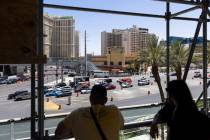Renovation of Golden Nugget Atlantic City spurs widespread praise



ATLANTIC CITY
Landry’s Inc. paid $38 million two years ago to acquire the rundown, money-losing Trump Marina, and analysts immediately predicted the gaming market’s demise. A few years earlier Trump Marina had been valued as high as $315 million.
The bargain-basement price cemented concern that Atlantic City, where citywide annual gaming revenues fell 41 percent over the past six years, was worse off than many believed.
That’s no longer prevailing wisdom.
Houston-based Landry’s, which owns the Golden Nugget casinos in Las Vegas, Laughlin and Biloxi, Miss., spent $150 million to transform the 740-room hotel-casino. Now called Golden Nugget Atlantic City, it has been universally praised by city and tourism leaders and the competition.
“The pool level is spectacular,” said Elizabeth Cartmell, president of Atlantic City Alliance, the city’s marketing agency. “They did a tremendous job on the property. They got a real bang for their money.”
Landry’s, controlled by Texas developer Tillman Fertitta, remodeled the 80,000-square-foot casino and hotel rooms, added retail space and opened the company’s top restaurants, Chart House and Vic & Anthony’s Steakhouse.
The building, which overlooks the Frank S. Farley Marina, now resembles downtown Las Vegas’s Golden Nugget.
Golden Nugget Vice President of Marketing and Advertising Amy Chasey said the casino retained Trump Marina’s customer database and kept in touch for 11 months while remodeling every square inch of the resort.
“Because there was a lot of construction, we were more aggressive with our marketing messages,” Chasey said. “We wanted the customers to know that every time they came, they would see something new. On Day One, we had customers trade out their Trump players card for our 24 Carat Club card. Those efforts paid off.”
Through April, Golden Nugget’s gaming revenues are at $39.6 million, down 6.1 percent, but far better than under the casino’s previous name.
The competition says the city should take note of Landry’s approach.
“They acquired a property at a very low price and cleaned it up,” said Borgata President Tom Balance, whose market-leading resort is across the Route 87 highway, which connects Atlantic City with Brigantine in south New Jersey. “That’s what this town needs. To be candid, I believe some of the assets in this town need to be transferred to owners with better balance sheets who can make them more attractive.”
While not on the scale of the Golden Nugget renovation, older Boardwalk properties are undergoing significant remodels that could help revive their prospects.
Both developments, which weigh heavy on nongaming amenities, are expected to open by Memorial Day Weekend, just ahead of the busy summer season.
Resorts Casino Hotel is completing a $35 million expansion for a Jimmy Buffett’s Margaritaville complex that includes a Margaritaville restaurant and LandShark Bar & Grill built on the Boardwalk at the site of the former Steeplechase Pier, and a Margaritaville-themed casino area.
“There is no question that owners at these companies are making a concerted effort to expand nongaming amenities,” said Resorts CEO Mark Giannantonio. “We’re looking at ways to exploit the beautiful views that we have and attract a younger demographic.”
Tropicana Atlantic City, which spent $25 million last year to upgrade hotel rooms, also is adding nongaming amenities along its Boardwalk frontage.
Among the restaurants being added are a Tony Luke’s outlet, one of South Philadelphia’s signature cheesesteak franchises, and a branch of Philadelphia’s Chickie’s and Pete’s Crab House and Sports Bar, which was voted the nation’s No. 1 sports bar in an ESPN survey last year.
Tropicana CEO Tony Rodio said nongaming amenities are the best way to attract customers that now can find casinos in their hometowns.
“In the early ’90s, everybody was rushing to take bars off the casino floors just to squeeze in as many slot machines as possible,” Rodio said. “Now people are taking out slots to put in nongaming amenities. We took out 30 to 40 slot machines to make the Tangos Lounge bigger. We took out an underused slot machine area to create a nightclub called Boogie Nights that has been wildly successful.”
Money from the Casino Reinvestment Development Authority has helped with renovations.
The authority was created in the 1980s to collect 1.25 percent of gaming revenues from each casino for use in the community and economic development around the state.
In 2011, the state gave the authority more control over the casinos’ contributions, allowing them to use the money on nongaming amenities.
As a result, the authority is paying for almost half of Resort’s Margaritaville project and part of the Tropicana restaurant expansion.
Also, the authority will fund $40 million of the estimated $140 million conference center expansion at Harrah’s Atlantic City.
“The money has to be nongaming specific,” said Authority Executive Director John Palmieri. “It can’t be used to buy slot machines.”
The Casino Reinvestment Development Authority also paid for a parking garage for The Walk, an outlet retail complex between the Boardwalk and the Convention Center, and gave $6 million to help renovate the historic Steel Pier near the Trump Taj Mahal.
“Our contribution helped the pier add new rides and attractions and the (Catanoso) family was able to obtain another $14 million in private equity funds to continue the development,” Palmieri said.
The 2011 legislation also allows development of two boutique-style hotel-casinos with a minimum of 200 rooms.
However, developers only expressed interest in restoring old buildings.
“It had to be brand-new development, so we’re not really sure where this is headed,” said Authority Deputy Executive Director Susan Ney.
Atlantic City’s prospects hinges on finding new ownership for older hotel-casino properties that haven’t changed much in two decades.
Recent events in Atlantic City suggest that owners of several eyesores want to move forward with sale or development deals.
Economics and outside factors, however, have slowed transactions.
Last month billionaire Carl Icahn, who holds the mortgage on the two Trump casinos, canceled the sale of the aging Trump Plaza for $20 million to the California-based Meruelo Group, which owns the Grand Sierra in Reno.
Icahn said the price for the Boardwalk’s worst-performing casino was too low.
Meanwhile, acquisition of the Atlantic Club by the Isle of Man-based parent of online gaming giant PokerStars collapsed earlier this month.
PokerStars went to court in New Jersey a week later to salvage the deal, saying it had already funded $11 million of the agreed upon $15 million purchase price to keep the 801-room Boardwalk hotel-casino open.
In each case, prospective buyers said they would invest millions of dollars to make the properties viable once again.
New investment excites the community. Last month a columnist for the Press of Atlantic City reported Penn National Gaming was looking at the aging Showboat, one of four Atlantic City casinos owned by Caesars Entertainment Corp.
Both companies denied the report but the initial news caused a stir.
In 2010, New York real estate mogul Morris Bailey and casino operator Dennis Gomes purchased Resorts for $31.5 million.
At that time it was the lowest price ever paid for a Boardwalk casino.
Resorts, the city’s first casino to open after gaming was legalized in 1978.
It will rebrand with a Roaring ’20s theme, playing on HBO’s “Boardwalk Empire” series set in Prohibition-era Atlantic City.
Gomes died last year. Mohegan Gaming Advisors, the investment arm of the Mohegan Indian Tribe, took a 10 percent stake in Resorts.
Bailey vowed to spend $60 million in the first half of 2013 to upgrade the property. In addition to the Margaritaville complex, Resorts is renovating hotel rooms, redoing bathrooms, adding a food court and two VIP players’ clubs. The casino is getting new carpeting and the parking garage is being improved.
Giannantonio said gaming enhancements are a small part of the renovation plans, but new amenities attract casino players as well.
“There are people still coming here for the gaming, and we can’t forget about them and why they are vitally important to us,” Giannantonio said. “At the end of the day, however, the city has to transform itself into more of a destination. People will come and stay in our hotel, and we’ll have all those ancillary nongaming revenues. But we’re still going to get some gaming out of them.”
Contact reporter Howard Stutz at hstutz@reviewjournal.com or 702-477-3871. Follow @howardstutz on Twitter.


















